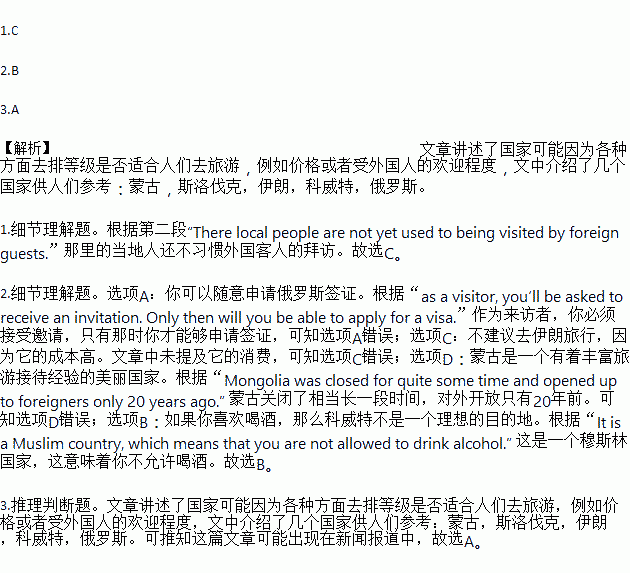题目内容
Countries may be ranked by many various groups, such as how expensive or interesting they are to foreign tourists. They can also be ranked by their openness and friendliness toward visitors. You might be shocked to find out that, for example, the USA is number 102 on the list of the least welcoming places, 140 being the most unfriendly land.
Mongolia
Mongolia was closed for quite some time and opened up to foreigners only 20 years ago. That’s probably the major reason why it is not yet experienced enough in hosting tourists. The country is beautiful, with huge spacious areas of land that are low populated. There local people are not yet used to being visited by foreign guests.
Slovakia
There are, undoubtedly, pluses as well as minuses in every country. Slovakia is not the perfect destination for a couple of reasons. First and foremost, Slovakia is becoming more and more similar to the rest of European countries surrounding it. Sameness is not the best quality. As a rule, tourists want to travel and see things they have never seen before. It is good that the land’s countryside is still unique, although it is also being commercialized day by day.
Iran
Iran is not the best place to travel to. It is located close to Pakistan with its negative political atmosphere. Western visitors are not welcome over there and embassies (大使馆) advise against traveling to Iran. The population, contrary to the country’s government, consists of very friendly and welcoming people.
Kuwait
In Kuwait people are warm and friendly. It has a unique history, plenty of traditions and customs. People respect their culture and are very religious. It is a Muslim country, which means that you are not allowed to drink alcohol. If you happen to visit Kuwait during Ramadan, you will not be allowed to eat in public places, either.
Russia
Russia is truly a special place. It is definitely worth visiting. What you might not find attractive is the corruption and bureaucracy (官僚主义) that rule in some certain official circles. Another nuisance you should be ready for is that, as a visitor, you’ll be asked to receive an invitation. Only then will you be able to apply for a visa. Once you arrive in Russia, you’ll be warmly greeted and accepted by the local people.
1.You’ll meet friendly people in the following countries except in _____.
A. Iran
B. Kuwait
C. Mongolia
D. Russia
2.Which of the statements is true according to the text?
A. You can apply for a visa for Russia at will.
B. If you’re fond of drinking, then Kuwait is not an ideal destination.
C. You’re not advised to travel in Iran due to its high cost.
D. Mongolia is a beautiful country with much experience in hosting tourists.
3.Where does this passage probably come from?
A. A news report
B. A lecture speech
C. An advertisement
D. A text book
 ABC考王全优卷系列答案
ABC考王全优卷系列答案

 In some Asian countries, eating with the left hand is considered impolite.
In some Asian countries, eating with the left hand is considered impolite.